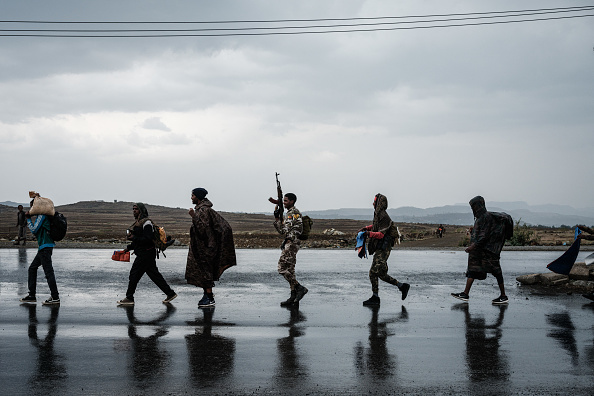Nairobi – Tigrayan rebels said on Saturday they have secured “full control” of the strategic northern Ethiopian city of Dessie, sparking a furious denial by the government even as residents reported a retreat by federal forces from the area.
The capture of Dessie by the Tigray People’s Liberation Front (TPLF) marks a new step in its offensive in the nearly year-long war, after it retook most of Tigray from federal forces in June and expanded its presence into neighbouring regions.
In response to the TPLF’s latest push southward, the United States on Saturday called on the rebels to withdraw from the regions of Afar and Amhara, home of Dessie.
A TPLF spokesperson, Kindeya Gebrehiwot, had earlier tweeted that “the city of Dessie is under full control of our forces”.
Ethiopia’s government denied the rebels’ claim, saying: “Dessie and its surroundings are still under our security forces.”
ALSO READ | ‘Ethiopia air strike on Tigray kills 10,’ hospital, rebel sources say
But residents told AFP earlier that Ethiopian forces had retreated from Dessie, following heavy fighting and power outages.
Much of northern Ethiopia is under a communications blackout and access for journalists is restricted, making battlefield claims difficult to verify independently.
“At around 2 am Ethiopian soldiers began retreating from the area,” said Amir, a Dessie resident who declined to give his second name.
TPLF fighters “entered the city, with ENDF (Ethiopian National Defence Force) soldiers not seen,” said another resident who gave his name only as Mohammed.
“I don’t know if the soldiers left or were captured,” he told AFP, adding that he was trying to flee to the town of Kombolcha, located further south.
‘Stressful situation’
Dessie, which is located in the Amhara region neighbouring Tigray, lies about 400 kilometres (250 miles) north of the Ethiopian capital Addis Ababa.
Residents had earlier reported a heavy military build-up in the area, as civilians fleeing conflict-hit towns further north poured into Dessie seeking refuge.
On October 20 the TPLF had claimed the rebels were “within artillery range” of Kombolcha and Dessie.
The following day Amhara regional president Yilkal Kefale urged armed Amharas to converge on Dessie to defend it.
ALSO READ | Ethiopia launches air strike on Tigray’s ‘western front’
On Saturday afternoon, as fighting receded in Dessie, TPLF rebels wandered the streets while civilians piled into buses headed southwards, a local shopkeeper told AFP.
“Now the city is quiet, people are either in their home or… fleeing to Kombolcha,” said the man, who only gave his first name Fantahun.
“We are in a stressful situation,” he said, adding that he and other retailers had all downed the shutters on their stores, fearing violence.
TPLF spokesman Kindeya warned Kombolcha residents “to stay in-doors”, in a possible sign of further fighting to follow.
Tigray air strikes
Tigray meanwhile has faced near-daily aerial bombardments since last week as the military steps up its use of air power in the war.
According to a hospital official, 10 people died in an air strike on Thursday, while the UN said two strikes on the Tigrayan capital Mekele on October 18 killed three children. Another person died in a separate attack this month.
The government said the facilities bombed in northern and western Tigray were military in nature and aiding the TPLF.
The bombings have drawn international censure, and disrupted UN access to the region where an estimated 400,000 people face famine-like conditions under a de-facto aid blockade.
The US State Department urged the TPLF to “halt its advances in and around the cities of Dessie and Kombolcha”.
ALSO READ | UN cancels Tigray flights after Ethiopia government airstrike
“We urge the TPLF not to use artillery against cities and recall our strong objections to the ENDF airstrikes in Mekele and other areas of Tigray which have cost countless lives,” State Department spokesperson Ned Price said in a statement.
The conflict erupted last November when Prime Minister Abiy Ahmed deployed troops in Tigray, with the operation spiralling into a prolonged war marked by massacres, mass rapes and a humanitarian crisis.
The prime minister, who won the Nobel Peace Prize in 2019, said the operation was in response to attacks on army camps by the TPLF, the regional ruling party which dominated national politics for three decades before Abiy took office.
He vowed a swift victory, but by late June the rebels had regrouped and retaken most of Tigray, including Mekele, and fighting spread to the neighbouring regions of Amhara and Afar.
Follow African Insider on Facebook, Twitter and Instagram
Picture: Getty Images
Source: AFP
For more African news, visit Africaninsider.com


